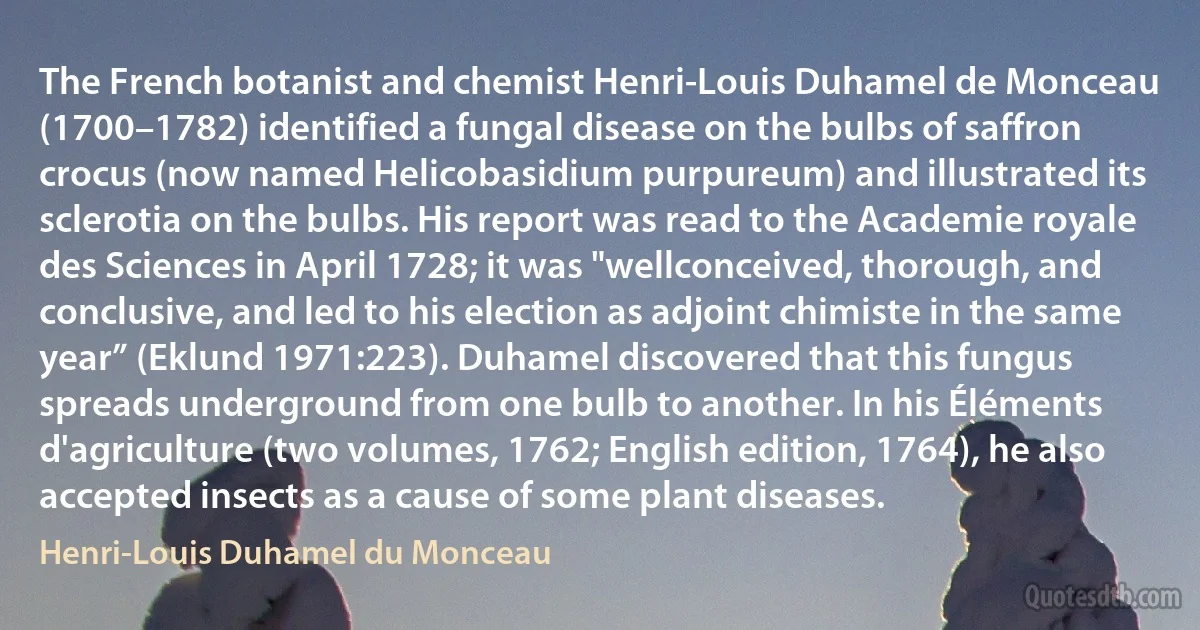
The French botanist and chemist Henri-Louis Duhamel de Monceau (1700–1782) identified a fungal disease on the bulbs of saffron crocus (now named Helicobasidium purpureum) and illustrated its sclerotia on the bulbs. His report was read to the Academie royale des Sciences in April 1728; it was "wellconceived, thorough, and conclusive, and led to his election as adjoint chimiste in the same year” (Eklund 1971:223). Duhamel discovered that this fungus spreads underground from one bulb to another. In his Éléments d'agriculture (two volumes, 1762; English edition, 1764), he also accepted insects as a cause of some plant diseases.
Henri-Louis Duhamel du MonceauRelated topics
april bulb cause disease edition english french fungus illustrated led now plant read thorough year royale sciencesRelated quotes
Hourly reports are received by telegraph, giving the position of all the passenger and the principal freight trains. In all cases where passenger trains are more than ten minutes, or freight trains more than half-an-hour behind time, on their arrival at a station the conductors are required to report the cause to the operator, who transmits the same by telegraph to the General Superintendent; and the information being entered as fast as received, on a convenient tabular form, shows, at a glance, the position and progress of trains, in both directions, on every Division of the Road.

Daniel McCallum
It will be said, "Patriotism has welded mankind into states, and maintains the unity of states." But men are now united in states; that work is done; why now maintain exclusive devotion to one's own state, when this produces terrible evils for all states and nations? For this same patriotism which welded mankind into states is now destroying those same states. If there were but one patriotism say of the English only then it were possible to regard that as conciliatory, or beneficent. But when, as now, there is American patriotism, English, German, French, Russian, all opposed to one another, in this event, patriotism no longer unites, but disunites.

Leo Tolstoy
The evidence of evolution pours in, not only from geology, paleontology, biogeography, and anatomy (Darwin's chief sources), but from molecular biology and every other branch of the life sciences. To put it bluntly but fairly, anyone today who doubts that the variety of life on this planet was produced by a process of evolution is simply ignorant - inexcusably ignorant, in a world where three out of four people have learned to read and write. Doubts about the power of Darwin's idea of natural selection to explain this evolutionary process are still intellectually respectable, however, although the burden of proof for such skepticism has become immense...

Daniel Dennett
For him it was a dark passage which led to nowhere, then to nowhere, then again to nowhere, once again to nowhere, always and forever to nowhere, heavy on the elbows in the earth to nowhere, dark, never any end to nowhere, hung on all time always to unknowing nowhere, this time and again for always to nowhere, now not to be borne once again always and to nowhere, now beyond all bearing up, up, up and into nowhere, suddenly, scaldingly, holdingly all nowhere gone and time absolutely still and they were both there, time having stopped and he felt the earth move out and away from under them.

Ernest Hemingway
Consider your state of mind-your consciousness-before going to sleep. This is extremely important. Make a commitment to spend at least fifteen minutes spiritualizing your consciousness before going to bed. Read something spiritual, listen to spiritual discourse or music, or engage in discussion on a spiritual topic. Push aside the chaos and confusion that were a part of your day, and focus on spiritual reality. In this way, you will prepare yourself for the next six to eight hours of sleep. If you allow yourself to focus spiritually, you will provide less of an opportunity for negative elements to enter your dreams. You can then benefit most from your sleeping state.

Bhakti Tirtha Swami
